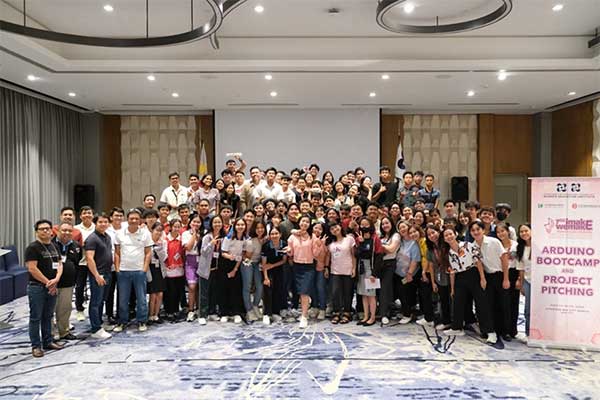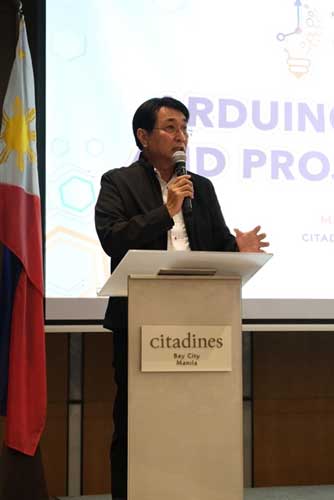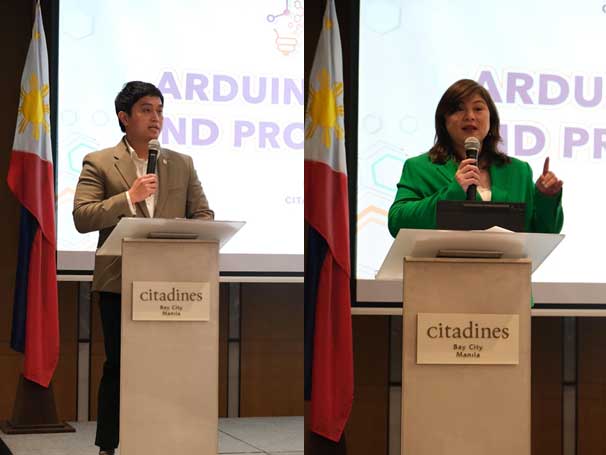The youth have a pivotal role in driving innovative technologies and reshaping the future landscape of the world, catalyzing positive change and igniting a global renaissance of progress.
Therefore, in the face of daunting global issues – from escalating climate concerns, ongoing health crises, and alarming environmental problems; and the relentless quest for a sustainable future, it is imperative to tap into and galvanize the boundless potential of the youth to empower them to step up and devise pioneering solutions to uplift their communities – and the world.
Recognizing that to realize this means investing in the youth’s innate capabilities, the imake.wemake:create.innovate.collaborate – an innovation competition designed to harness creativity and ingenuity from senior high school students across the Philippines to generate solutions to pressing societal and community issues – is back to reignite its mission to inspire and empower the next generation of innovators.
Now in its 7th cycle, this year’s imake.wemake Arduino Bootcamp and Project Pitching was held on March 18-22, 2024, at the Citadines Bay City Manila.

From ideas to action: A look inside the training sessions
The Arduino Bootcamp and Project Pitching is the second of the three stages of the competition, namely: (1) Call for Proposals and Selection; (2) Technical Training/Workshop and Project Pitching; and (3) Final Project Presentation and Judging.
Organized by the Department of Science and Technology – Science Education Institute (DOST-SEI), the week-long workshop was participated by the top 20 carefully selected schools; and facilitated by seasoned experts from ThinkLab Philippines who provided a hands-on training on basic electronics and Arduino fundamentals, programming, and troubleshooting.
Furthermore, besides the technical workshop, Engr. Wilfredo Calaguan of the Intellectual Property Office of the Philippines Intellectual Property Business Services and Development Division imparted the significance of Intellectual Property (IP) and the value of safeguarding intellectual assets to cultivate among the youth a culture of innovation and responsible citizenship.
Additionally, the finalists were given the opportunity to present their ideas before the Board of Judges (BOJ) – giving them the platform to showcase their creativity and seek constructive feedback and guidance from the experts.
“The future of innovation looks bright in the Philippines. It is because of the new generation of Filipino innovators who did not let their young age hinder their desire to transform their ideas into game-changing solutions,” remarked Engr. Albert G. Mariño, DOST-SEI Deputy Director, in his welcome remarks.
“We, at the DOST-SEI, have been continuously creating interventions that aim to give Filipinos, especially the youth, a space to explore and discover on their own, with the belief that even the young minds have an inherent ability to learn and draw conclusions about what science can do to preserve our world and improve our quality of life,” he added.

Over the years, the imake.wemake has continuously partnered with some of the biggest names in the fields of Science, Technology, Engineering, and Mathematics (STEM), and electronics. These partnerships share the common goals of promoting a strong culture of science among the Filipino youth to encourage, recognize, and support them in pursuing careers in STEM on the road to becoming future innovators and nation builder.
In the event were Mr. John Emyl G. Eugenio, Chief Operations Officer of the C&E Publishing, Inc. (CEPI), and Ms. Grace R. Colet, Executive Director of the Gokongwei Brothers Foundation (GBF).
Through these partnerships, the finalists have the chance to receive the C&E Adaptive Learning Solutions (CEALS) Innovation Award given to a school team whose project exhibits excellent design using the Arduino platform, and the GBF Young Scientist Award which is a college scholarship conferred to outstanding students who exhibit admirable values and a strong commitment to STEM education; while the three winning teams will be awarded the Youth Innovation Prize with Php 200,000.00 each, courtesy of Honda Cars Philippines, Inc. (HCPI).
In addition to this, Ms. Colet extended her words of encouragement to the students, reminding them to always remember their why’s – the driving forces behind their passion for STEM and innovation to continue pushing boundaries and make meaningful contributions to the field.
Mr. Eugenio, on the other hand, highlighted the growing significance of STEM education and its role in shaping the country’s future. He emphasized the importance of nurturing talent and fostering an environment that paves the way to supporting and promoting STEM initiatives for a brighter and more innovative future for the Philippines.

This year, the DOST-SEI received 94 proposals from private and public high schools nationwide – the highest submission rate since its debut in 2017. From these, the BOJ evaluated the ventures to determine the finalists based on the novelty, innovation, and impact of the project on pressing societal and community issues in agriculture, health, food security, transportation, education, business, disaster mitigation, and the environment.
The 20 finalists of the 7th imake.wemake are:
- Alabel National Science High School – “Project CornDOC: An Automated Corn Fusarium (Fusarium verticillioides) Monitoring and Detection Device using Volatile Organic Compounds (VOCs) Deep Learning”
- Alaminos City National High School – “CORPS: Image Detecting and Monitoring Device for Coral Diseases and Damages”
- Bambad National High School – “HYDRA: A SEMI-AUTOMATED ROBOT AS AN ABSORBENT AGENT FOR OIL SPILLS USING SKIMMING METHOD”
- Bansud National High School – Regional Science High School for MIMAROPA – “AQUASTELLAR: Development of an Alternative and Low-cost Portable Lamp Using Various Solutions Derivative Electrolytes”
- Bantayan Science High School – “Project BASSA: An IoT-based Buoy Automatic Sanctuary Security Assistance”
- Basud National High School – “CHIC: Solar-Powered Autonomous SMART Arduino-Based Poultry Coop with Disease Diagnostic Isolation Lab”
- Bucal National Integrated School – “Arduino-Based Braille and Text Imaging-Processing System (ABBTIPS) Using ESP32 Camera Module for the Blind”
- Caloocan National Science and Technology High School – “Innovation for the Synergistic Potency of RHISHELL (Rhizoclonium sp. and Eggshell waste) Arduino Metal Contaminant Sensor as an Alternative Wastewater Treatment”
- Camarines Sur National High School – “Lexar: Arduino-based Multifunctional Learning Device Utilizing CNNxRNN and ChatGPT API for Improved Learning Development Skills”
- City of Bogo Senior High School – “AGRIGENT: Enhancing Greenhouse Agriculture with IoT (Internet of Things)-Enabled Automated Fertigation and Rainwater Harvesting System for Improved Crop Growth and Water Efficiency”
- Iligan City National High School – “S.A.G.A.N.A.: Smart Agriculture with Greenhouse Automated Nebulization and AI Assessment”
- Laguilayan National High School – “Smart Aquaponics: Integrating Internet of Things (IoT) and Arduino for Sustainable Farming Efficiency”
- Las Piñas City National Science High School – “THERMOSENSE: Deep Learning-based Thermal Radiomics with 3D Reconstruction for Breast Cancer Diagnosis using Arduino”
- Limay Senior High School – “Efficient Code Recognition and Enhanced Auditory Device (EC-READ): Reading Assistive Device for Visually Impaired”
- Masbate National Comprehensive High School – “SILEYE: Object Detection and Identification Headgear with Voice Output for Learning of Visually Impaired Persons”
- Mother Theresa Colegio – “Project Panganoron: a smart monitoring system for lahar and landslide threats in Mt. Mayon”
- Philippine Science High School – Bicol Region Campus – “Arduino-Based Smart Traffic Control Using Weighted Prioritization of Vehicles”
- Philippine Science High School – Eastern Visayas Campus – “Project PAGSACA: Innovations on Vertical Farming (PMFC And orGanic Solar cells for Accumulating Charge through Agriculture)”
- Rizal National Science High School – “SALAMUHA: Filipino Sign Language Assistive System via Convolutional Neural Network for Holistic Learning and Inclusive Communication”
- Vinzons Pilot High School – “AquaeX: A Comprehensive Water Quality Monitoring Device with Ultrasonic Technology for Algal Bloom Control”
The school teams are given a build and test period of three months. They will convene again on July 24-27, 2024, for the Final Project Presentation and Judging.
















